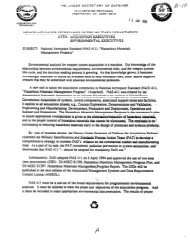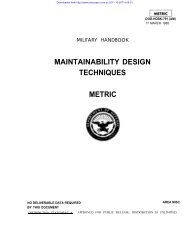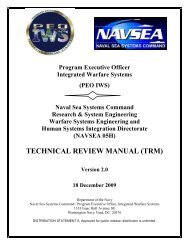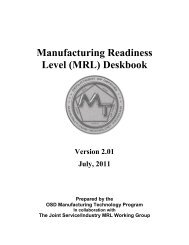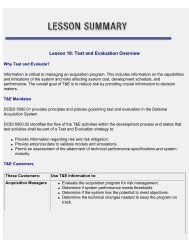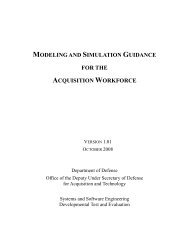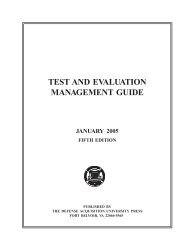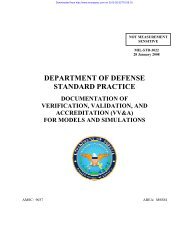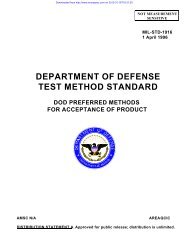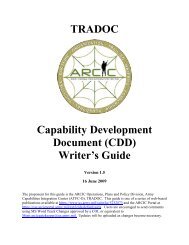MIL-HDBK-502 - Barringer and Associates, Inc.
MIL-HDBK-502 - Barringer and Associates, Inc.
MIL-HDBK-502 - Barringer and Associates, Inc.
Create successful ePaper yourself
Turn your PDF publications into a flip-book with our unique Google optimized e-Paper software.
<strong>MIL</strong>-<strong>HDBK</strong>-<strong>502</strong>: ACQUISITIONALOGISTICSoptions in Section H. (Refer to FAR 52.216 - 20 <strong>and</strong> FAR 52.216 - 22 forguidance). When the government provides the contractor with governmentfurnished property for executing the contract, this information is included inSection H under the appropriate government property clauses, i.e., FAR52.245-2 for fixed-price contracts <strong>and</strong> FAR 52.245-5 for Government Property(Cost-Reimbursement, Time-<strong>and</strong>-Material, Or Labor-Hour Contracts). Theseclauses set forth the specifics of the relationship between the government <strong>and</strong>contractor.Warranty ClausesSince January 1985, DoD has been required to use certain express warrantiesin each contract for the production of a weapon system with a unit costexceeding $100,000 or a total cost exceeding $10 million. U.S.C. §2403describes the codification of weapon system warranty requirements. Theexpress warranties specify that the weapon system will: (a) conform to thedesign <strong>and</strong> manufacturing requirements in the contract; (b) be free from alldefects in materials <strong>and</strong> workmanship at the time of acceptance or delivery asspecified in the contract; <strong>and</strong> (c) conform to the "essential performancerequirements" (operating capabilities needed for the system to functionproperly), as specifically set forth in the production contract. The latter isessentially a warranty that the system will work. It is required only for aweapon system in "mature, full-scale production."This statute makes three specific remedies available to the government in theevent that one of the conditions of these warranties is breached. Thegovernment may require the contractor to correct the defect at no cost to thegovernment; the government may correct the defect <strong>and</strong> charge the cost to thecontractor; or the government may correct the defect <strong>and</strong> reduce the price todeduct the cost of repairs. The statute does not allow the alternative ofreducing the price <strong>and</strong> not correcting the defect.The contracting officer may not waive the required warranties, but may requirethat they provide more coverage or greater remedies than stated in the statute.If a warranty would not be cost-effective or would not be in the best interest ofnational defense, a waiver may be granted by the Secretary of Defense. Thisauthority may be delegated to the Assistant Secretary level of the Departmentof Defense or of each military department. The policy <strong>and</strong> procedureconcerning waivers is set forth in DFARS 46.770-9. If the weapon systeminvolved is a "major defense acquisition program," prior notice of such awaiver <strong>and</strong> an explanation must be given to the Congressional committees onArmed Services <strong>and</strong> Appropriations; for other such waivers, the notice <strong>and</strong>explanation are to be included in an annual report to these committees (10U.S.C. §2403(e)).With reference to FAR 46.7 <strong>and</strong> DFARS 246.7, warranty provisions must beimposed on most new material systems to ensure that the deliverables: (a)8-14




